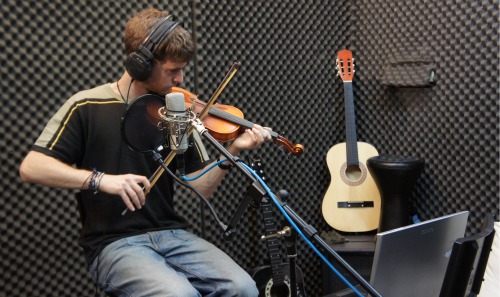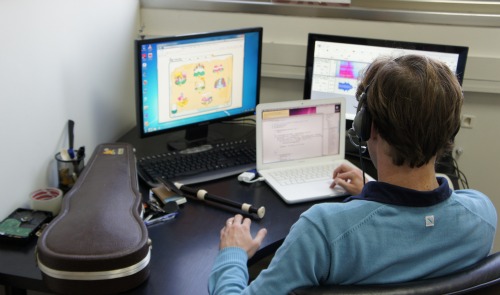
Yuval Kaminka was visiting his brother’s family two years ago when he noticed that his seven-year-old nephew was playing Wii Tennis — a pretty sophisticated video game – without knowing a word of English. The boy apparently had taught himself through trial and error and was now wielding a racket like a virtual Andre Agassi.
When Mom came into the room and began cajoling her son to practice his musical instrument, the boy came up with “every excuse possible to a seven-year-old,” Kaminka tells ISRAEL21c. “He said it was boring, he had a stomach ache … kids can get very creative when they want to get out of things, you know.”
That’s when the proverbial light bulb switched on in Kaminka’s computer-science-trained brain. Now 29, Kaminka had just finished his master’s degree at the Weizmann Institute of Science and was looking around for something to do. Why not wed an activity many kids hate – practicing their instruments – with something they love and intuitively excel at, such as fly-‘em-and-shoot-‘em up electronic games?
Making music lessons a joy
A few months later, Kaminka’s new company, JoyTunes, was born with a vision to do just that. The company’s first product was released in 2010. It allows children ages six and up to control actions on the computer or big-screen TV using a simple recorder, the instrument on which most kids start learning to play music.
The game features a variety of levels where helicopters and planes fly up and down and through obstacles, picking up prizes along the way. Rather than using a joystick or mouse, though, you play particular notes, increase or decrease the volume, or sustain a tone for a specified length of time.
Interacting with a game through music is not unique – the popular Rock Band and Guitar Hero systems both use instruments to allow you manipulate what’s on the screen.
“But those are primarily for entertainment,” Kaminka points out. JoyTunes, while certainly entertaining, was designed primarily to be educational. The system, he stresses, is not meant to replace a music instructor but to increase the likelihood that students will do their homework.
Kaminka teamed up with his brother, Yigal, an award-winning, professional musician with a double MA in oboe and (not coincidentally) the recorder from the University of Karlsruhe in Germany, to design the program. The company’s technical guru is Roey Izkovsky, who served with Yuval Kaminka in a prestigious Intelligence Corps unit in the Israel Defense Forces. “He’s a real expert in signal analysis,” Kaminka says.

No hardware to buy
Part of JoyTunes’ appeal is that there are no wires, nor do you need to buy a special, expensive device (as you do for Guitar Hero or Rock Band). JoyTunes uses a standard off-the-shelf microphone (“you can buy one for $5,” Kaminka says, or use the one built into your laptop) and the recorder your child may already have from lessons at school. The JoyTunes software then “listens” to the recorder and translates what it hears into action in the game.
The company is thus far entirely self-funded with financing from family and friends, Kaminka says. So, while selling to kids and their parents is the ultimate aim, JoyTunes is focusing first on forging partnerships with instrument manufacturers and music teacher associations in Israel, the United States and Germany.
Consumers can, of course, download the software from JoyTunes’ website. The price for a single instrument is $30. There will be additional paid instrument packages as more are introduced down the road, as well as premium content with different songs or more gaming levels. JoyTunes also sells a packaged DVD with a recorder and microphone in the box for $59 (currently discounted to $54).
Hitting high notes
JoyTunes has already grabbed the attention of several high-profile players. The company received a nod from the US Parents Choice website as one of the winners of its Fall 2010 Small Screen awards. And it placed in the top 26 finalists at the Boston-headquartered MassChallenge accelerator program, for which 450 companies applied. This gives JoyTunes free use of a Boston office till the summer at its discretion; its staff of six works out of Kfar Saba.
Despite the hard work and challenges ahead, Kaminka says he’s having a great time. “I’ve been working a year and a half without a salary,” he says. “It has to be something I love.”
http://www.youtube.com/watch?v=Q22V-r0qNOQ&NR=1
What instruments are on the JoyTunes wish list? While Kaminka won’t commit, videos posted on YouTube shows the software working with a piano, flute (see above video), oboe and violin – the latter is an instrument Kaminka played as a child – which just might benefit everyone in a screechy-string-plagued household.
I know that pain personally,” Kaminka says with a smile.














